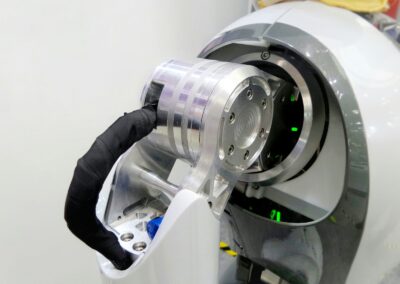Advancements in AI and Their Impact on Decision-Making
The Role of AI in Transforming Decision-Making Processes
The future of AI in decision-making is poised to revolutionize how businesses and societies function. In Saudi Arabia and the UAE, where technological innovation is integral to national development strategies, the advancements in AI and machine learning are particularly impactful. AI systems are increasingly being integrated into decision-making processes across various sectors, enhancing efficiency, accuracy, and strategic planning.
In Riyadh, the Vision 2030 initiative emphasizes the adoption of AI technologies to drive economic growth and improve public services. AI-driven decision-making tools are being used in sectors such as healthcare, finance, and urban planning. For example, AI algorithms analyze vast amounts of data to predict patient outcomes and optimize treatment plans, significantly improving healthcare delivery. In finance, AI systems enhance risk assessment and fraud detection, providing more robust financial services. The integration of AI into these decision-making processes allows for data-driven strategies that improve overall outcomes and operational efficiency.
Dubai, known for its ambitious smart city initiatives, leverages AI to enhance urban management and governance. The city utilizes AI-powered platforms to manage traffic flow, energy consumption, and public safety. These systems analyze real-time data from various sensors and devices, enabling city planners to make informed decisions that enhance the quality of life for residents. The use of AI in decision-making processes ensures that resources are allocated efficiently, and potential issues are addressed proactively. By embracing AI, Dubai is setting a precedent for smart urban management and sustainable development.
Machine Learning and Automation in Business Decision-Making
Machine learning and automation are key components of AI that significantly influence business decision-making. In Saudi Arabia and the UAE, companies are adopting these technologies to gain a competitive edge and streamline operations. Machine learning algorithms can analyze historical data to identify patterns and trends, providing valuable insights that inform strategic decisions.
In Riyadh, businesses are leveraging machine learning to optimize supply chain management, customer relationship management (CRM), and marketing strategies. Machine learning models predict demand fluctuations, enabling companies to manage inventory more effectively and reduce costs. In CRM, AI-powered tools analyze customer interactions to provide personalized recommendations and improve customer satisfaction. Marketing strategies benefit from machine learning by targeting the right audience with tailored content, increasing engagement and conversion rates. By integrating machine learning into decision-making processes, businesses in Riyadh can enhance efficiency and drive growth.
Dubai’s business landscape also benefits from the integration of machine learning and automation. The city’s dynamic economy, characterized by its emphasis on innovation and entrepreneurship, is an ideal environment for AI-driven decision-making tools. Companies in Dubai use automation to streamline repetitive tasks, such as data entry and processing, allowing employees to focus on more strategic activities. Additionally, machine learning models analyze market data to identify investment opportunities and optimize portfolio management. By adopting these technologies, businesses in Dubai can make more informed decisions, enhance productivity, and achieve sustainable success.
Ethical Considerations and Challenges
While the future of AI in decision-making offers numerous benefits, it also presents ethical considerations and challenges that must be addressed. In Saudi Arabia and the UAE, ensuring that AI systems are used responsibly and ethically is a priority. Issues such as data privacy, algorithmic bias, and transparency need to be carefully managed to maintain public trust and achieve equitable outcomes.
In Riyadh, regulatory bodies and policymakers are developing frameworks to govern the ethical use of AI in decision-making. These frameworks emphasize the importance of data privacy and security, ensuring that personal information is protected and used responsibly. Additionally, efforts are being made to address algorithmic bias by promoting diversity in AI development teams and implementing fairness checks in AI models. Transparency is another critical aspect, with guidelines requiring that AI-driven decisions are explainable and understandable to users. By addressing these ethical considerations, Riyadh aims to create a trustworthy and inclusive AI ecosystem.
Dubai’s approach to ethical AI involves collaboration between government, industry, and academia. The city’s AI Ethics Guidelines provide a comprehensive framework for the responsible use of AI, emphasizing fairness, accountability, and transparency. Companies are encouraged to conduct regular audits and assessments to identify and mitigate potential ethical issues. Additionally, Dubai is fostering a culture of continuous learning and adaptation, ensuring that ethical practices evolve with technological advancements. By prioritizing ethical considerations, Dubai aims to harness the benefits of AI while minimizing potential risks and ensuring that all stakeholders are treated fairly.
The Societal Impact of AI-Driven Decision-Making
Transforming Public Services and Governance
AI-driven decision-making is transforming public services and governance, leading to more efficient and responsive governments. In Saudi Arabia and the UAE, AI technologies are being used to enhance public administration, improve service delivery, and engage citizens more effectively.
In Riyadh, AI systems are being integrated into public administration to streamline processes and improve efficiency. For example, AI-powered chatbots assist citizens with inquiries and service requests, reducing the workload on government employees and speeding up response times. Additionally, AI-driven data analytics help policymakers identify trends and patterns, informing policy decisions that address societal needs more effectively. By leveraging AI, Riyadh is enhancing the quality and accessibility of public services, fostering a more responsive and citizen-centric government.
Dubai’s smart city initiatives also benefit from AI-driven decision-making in governance. The city uses AI to optimize resource management, enhance public safety, and improve environmental sustainability. AI-powered platforms analyze data from various sources to predict and mitigate potential issues, such as traffic congestion and energy shortages. These systems enable city planners to make data-driven decisions that enhance urban living and promote sustainable development. By integrating AI into governance, Dubai is creating a more efficient and resilient city that can adapt to future challenges.
Enhancing Education and Workforce Development
The future of AI in decision-making extends to education and workforce development, where AI technologies are being used to personalize learning experiences and prepare individuals for the evolving job market. In Saudi Arabia and the UAE, AI-driven educational tools and training programs are enhancing the quality of education and equipping the workforce with the skills needed for the digital economy.
In Riyadh, AI-powered learning platforms provide personalized educational experiences that cater to the unique needs and preferences of each student. These platforms use machine learning algorithms to analyze students’ performance and tailor content accordingly, ensuring that learning is effective and engaging. Additionally, AI-driven career guidance systems help students make informed decisions about their educational and career paths. By integrating AI into education, Riyadh is preparing its future workforce for success in a technology-driven world.
Dubai’s commitment to innovation extends to workforce development, with AI playing a crucial role in training and upskilling programs. The city offers AI-driven training programs that provide employees with the skills needed to thrive in the digital economy. These programs use AI to assess individual learning needs and deliver personalized training content, ensuring that employees acquire relevant and up-to-date skills. Additionally, AI-powered job matching platforms connect job seekers with opportunities that align with their skills and aspirations. By leveraging AI in education and workforce development, Dubai is fostering a highly skilled and adaptable workforce.
Leadership and Management in AI-Driven Decision-Making
Effective leadership and management are essential for the successful integration of AI in decision-making processes. In Saudi Arabia and the UAE, leaders in both the public and private sectors play a critical role in driving AI adoption and ensuring that it is used responsibly and effectively.
In Saudi Arabia, leadership in AI is driven by the Vision 2030 initiative, which outlines a clear vision for the role of technology in national development. Leaders are responsible for setting strategic priorities, fostering collaboration between stakeholders, and creating policies that promote the ethical use of AI. This involves investing in AI research and development, supporting AI education and training programs, and encouraging innovation. By demonstrating a commitment to responsible AI leadership, Saudi Arabia aims to become a global leader in AI-driven decision-making.
Dubai’s leadership in AI is characterized by its commitment to excellence and innovation. The city’s leaders prioritize the development of a robust AI ecosystem that supports sustainable growth and enhances quality of life. This involves fostering partnerships between government, industry, and academia to drive AI research and development, promote ethical AI practices, and ensure that AI technologies are accessible to all. By prioritizing effective leadership and management, Dubai aims to create an environment where AI-driven decision-making can thrive and contribute to societal well-being.
Conclusion: Shaping the Future with AI-Driven Decision-Making
The future of AI in decision-making is set to transform society and business in profound ways. In Saudi Arabia and the UAE, the integration of AI, machine learning, and automation into decision-making processes is enhancing efficiency, accuracy, and strategic planning across various sectors. By addressing ethical considerations, fostering effective leadership, and leveraging advanced technologies, these countries are paving the way for a future where AI-driven decision-making contributes to sustainable growth and societal well-being.
As AI technology continues to evolve, the commitment to responsible and ethical AI practices will be essential for navigating the complex landscape of AI-driven decision-making. By prioritizing transparency, accountability, and inclusivity, Saudi Arabia and the UAE are leading the way in harnessing the power of AI to achieve business success, enhance leadership and management skills, and address the challenges of modern technology. The ongoing investment in AI research and development ensures that these countries remain at the forefront of global innovation, ready to shape the future with AI-driven decision-making.
#AIinDecisionMaking #AIAdvancements #MachineLearning #Automation #SaudiArabia #UAE #Leadership #Innovation #ModernTechnology #BusinessSuccess






















